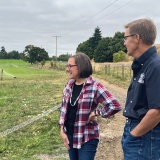Agriculture
Oregon’s Sixth District is home to a variety of specialty-crop growers that produce everything from blueberries to wine grapes to hazelnuts. The farming tradition in the Willamette Valley dates back hundreds of years. Due to the region’s unique and favorable climate conditions, it was publicized in the 1820s as a “promised land of flowing milk and honey.”
As your representative, one of my foremost priorities is to help secure and strengthen the district’s farming tradition. That is why I am pleased to be a member of the House Committee on Agriculture, particularly as Democrats on the Committee work to mitigate the harm caused by the drastic cuts to the Nutrition Program, and consider the next Farm Bill. The Farm Bill is a legislative package passed once roughly every five years that impacts the food and agricultural products grown and developed in the United States; sets forth the federal support that farmers across the country rely on; and provides food under the federal nutrition programs. The last Farm Bill Reauthorization was in 2018.
Unfortunately, my Republican colleagues have broken from a decades-long tradition of bipartisan cooperation on the Farm Bill by pulling out pieces of the Farm Bill and including them in their partisan reconciliation package – the One Big, Ugly Bill. One of these pieces was the nation’s largest federal nutrition program, the Supplemental Nutrition Assistance Program (SNAP). The One Big, Ugly Bill included almost $200 billion in cuts to SNAP, which 740,000 (1 in 6) Oregonians rely on — causing families to go hungry. The Republicans delivered on President Trump’s tax cuts for billionaires, at the expense of children, veterans, and seniors who need to eat. I strongly opposed these cuts, and I will work to undo the harm they will cause.
However, many pieces of the Farm Bill still need reauthorization , and I will continue to use my role on the Agriculture Committee to focus on advancing legislation that will expand the market, research, and funding opportunities for specialty crops. Specialty crop growers, like those in the Willamette Valley, have long been underserved by federal programming, and I will work to ensure they are treated fairly. Further, I’ll work to ensure that the Farm Bill gives small and mid-size farmers the tools they need to remain in production – including loan funding and technical assistance – and prevent the bill from becoming just another federal handout for big agri-businesses.
The threat of wildfires and other climate impacts to Oregon’s farms and forests cannot be understated. As the Ranking Member on the House Agriculture Forestry & Horticulture Subcommittee, I am well-positioned to drive meaningful federal action to support wildfire prevention and mitigation and other climate resilience measures in Oregon and the broader Pacific Northwest. For example, I have introduced the Civilian Conservation Center Enhancement Act, a bill that would support specialized training for wildland fire, forestry, and rangeland management — and cut the bureaucratic red tape associated with the Forest Service’s hiring of wildland firefighters. Further, I have supported common-sense solutions to reducing wildfire risk, like allowing for expedited removal of hazardous trees near power lines. I will continue working towards solutions that protect Oregonians from wildfires, while protecting our old-growth forests.








